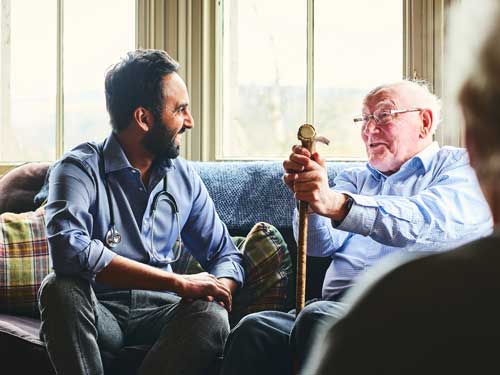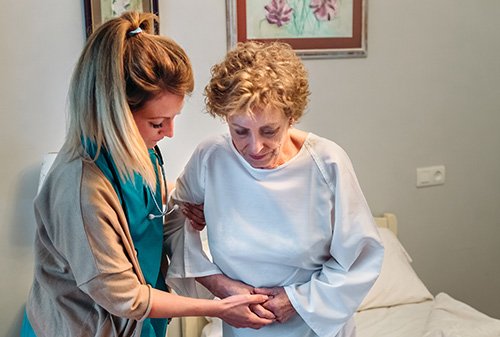




Ways of working in health and social care settings are described in an organisation’s written policies and procedures, and in records that have been agreed by all concerned and that allow needs to be met more flexibly. They are based on legislation, standards and professional body codes of practice. Workers are required to follow these ways of working to promote and maintain the health, safety and well-being of everyone in the workplace.
Ensuring that individuals are properly cared for when they access health and social care services requires the application of legislation, standards and codes of conduct and professional practice. This ensures individuals are given the best possible service.
The Code of Professional Practice for Social Care describes the standards of professional conduct and practice required of health and social care workers in Wales. The Code plays a key part in raising awareness of these standards. The Code promotes the values that underpin social care and support and seeks to embed them within working practice.
Individuals who access services, carers and family members need to know about the Code. The provision of safe care and support is everyone’s responsibility, not just health and social care workers and it is important that individuals in Wales know what to expect of social care workers.
Watch the following video about The Code of Professional Practice for Social Care
Caiff ffyrdd o weithio mewn lleoliadau iechyd a gofal cymdeithasol eu disgrifio fel rhan o bolisïau a gweithdrefnau ysgrifenedig sefydliad, ac mewn cofnodion y cytunwyd arnynt gan bawb dan sylw ac sy'n golygu y gellir diwallu anghenion mewn ffordd fwy hyblyg. Maent yn seiliedig ar ddeddfwriaeth, safonau a chodau ymarfer cyrff proffesiynol. Mae'n ofynnol i weithwyr ddilyn y ffyrdd hyn o weithio er mwyn hyrwyddo a chynnal iechyd, diogelwch a llesiant pawb yn y gweithle.
Er mwyn sicrhau bod unigolion yn cael gofal priodol pan fyddant yn defnyddio gwasanaethau iechyd a gofal cymdeithasol, mae angen cymhwyso deddfwriaeth, safonau a chodau ymddygiad ac ymarfer proffesiynol. Mae hyn yn sicrhau bod unigolion yn cael y gwasanaeth gorau posibl.
Mae'r Cod Ymarfer Proffesiynol ar gyfer Gofal Cymdeithasol yn disgrifio'r safonau ymddygiad ac ymarfer proffesiynol sy'n ofynnol gan weithwyr iechyd a gofal cymdeithasol yng Nghymru. Mae'r Cod yn chwarae rhan allweddol wrth godi ymwybyddiaeth o'r safonau hyn. Mae'r Cod yn hyrwyddo'r gwerthoedd sy'n sail i ofal a chymorth cymdeithasol ac yn ceisio eu cynnwys o fewn ymarfer gweithio.
Mae angen i unigolion sy'n defnyddio gwasanaethau, eu gofalwyr ac aelodau o'u teuluoedd wybod am y Cod. Mae cyfrifoldeb ar bawb i ddarparu gofal a chymorth diogel, nid dim ond gweithwyr iechyd a gofal cymdeithasol ac mae'n bwysig bod unigolion yng Nghymru yn gwybod beth i'w ddisgwyl gan weithwyr gofal cymdeithasol.
Gwyliwch y fideo dilynol am y Cod Ymarfer Proffesiynol ar gyfer Gofal Cymdeithasol

The Code applies to all Healthcare Support Workers employed in clinical and non-clinical settings within the NHS and is used in job descriptions. The Code of Practice for NHS Wales' employers is an important quality assurance process, supporting the employment, training and monitoring of Healthcare Support Workers in Wales.
Mae'r Cod yn berthnasol i bob Gweithiwr Cymorth Gofal Iechyd a gyflogir mewn lleoliadau clinigol ac anghlinigol ac fe'i defnyddir mewn disgrifiadau swydd. Mae'r Cod Ymarfer i gyflogwyr GIG Cymru yn broses sicrhau ansawdd bwysig, sy'n helpu wrth gyflogi, hyfforddi a monitro Gweithwyr Cymorth Gofal Iechyd yng Nghymru.
The Code of Practice for NHS Wales' employers is an important guidance and quality assurance document, supporting the job roles of Healthcare Support Workers in Wales.
The Code of Practice for Employers is underpinned by a Code of Conduct for Healthcare Support Workers which details the standards individuals must comply with. Both Codes support the basic principles of safety and public protection and should underpin the day to day working practices of NHS Wales.
Employers are required to develop and implement systems and processes to support Healthcare Support Workers to achieve the standards set out in the Code of Conduct. Employers also need to use the workplace as an opportunity to develop Healthcare Support Workers by providing working conditions that enable staff to carry out their roles effectively, preparing them to progress to new and extended roles.
Mae'r Cod Ymarfer i gyflogwyr GIG Cymru yn ddogfen ganllaw a sicrhau ansawdd bwysig, sy'n ategu rolau swydd Gweithwyr Cymorth Gofal Iechyd yng Nghymru.
Mae'r Cod Ymarfer i Gyflogwyr wedi'i ategu gan God Ymddygiad i Weithwyr Cymorth Gofal Iechyd sy'n nodi'r safonau y mae'n rhaid i unigolion gydymffurfio â nhw. Mae'r ddau God yn ategu egwyddorion sylfaenol diogelwch ac amddiffyn y cyhoedd a dylent weithredu fel sail i arferion gwaith beunyddiol GIG Cymru.
Mae'n ofynnol i gyflogwyr ddatblygu a gweithredu systemau a phrosesau er mwyn helpu Gweithwyr Cymorth Gofal Iechyd i gyrraedd y safonau a nodir yn y Cod Ymddygiad. Mae angen hefyd i gyflogwyr ddefnyddio'r gweithle fel cyfle i ddatblygu Gweithwyr Cymorth Gofal Iechyd drwy ddarparu amodau gwaith sy'n galluogi staff i ymgymryd â'u rolau'n effeithiol, gan eu paratoi i gamu ymlaen i rolau newydd ac estynedig.

The Practice Guidance for Residential Child Care for Workers Registered with the Social Care Wales also provides advice to help staff to support positive outcomes for children and young people. The guidance can also be used by employers to review procedures in relation to ensuring a professional and safe service. Sections in the guidance cover child-centred care and support, good residential child care practice, safeguarding individuals, health and safety, professional development, learning culture and contributing to the development of others and contributing to the service, including raising concerns. The guidance leads on from the ‘Code of professional practice for social care’. Failing to follow the guidance could put a worker’s registration at risk.
Mae'r Canllawiau Ymarfer ar gyfer Gweithwyr Gofal Preswyl Plant sydd wedi Cofrestru â Gofal Cymdeithasol Cymru hefyd yn rhoi cyngor er mwyn helpu staff i sicrhau canlyniadau cadarnhaol i blant ac unigolion ifanc. Gall cyflogwyr hefyd ddefnyddio'r canllawiau i adolygu gweithdrefnau mewn perthynas â sicrhau gwasanaeth proffesiynol a diogel. Mae'r adrannau yn y canllawiau yn ymdrin â gofal a chymorth sy'n canolbwyntio ar y plentyn, ymarfer gofal preswyl i blant da, diogelu unigolion, iechyd a diogelwch, datblygiad proffesiynol, diwylliant dysgu a chyfrannu at ddatblygiad eraill a chyfrannu at y gwasanaeth, gan gynnwys codi pryderon. Mae'r canllawiau yn ymhelaethu ar y 'Cod ymarfer proffesiynol ar gyfer gofal cymdeithasol'. Gallai methu â dilyn y canllawiau olygu y bydd cofrestriad gweithiwr yn y fantol.

The role and responsibilities of an individual's job should also clarify what they must not do. This could include activities which they have not yet been trained for, and tasks that they are not capable of doing because of an individual's health status or lack of experience, for example.
They should also state activities that an individual's age, sex and understanding prevents them from carrying out, such as helping someone of the opposite sex with intimate care needs. Working in ways that are clearly defined like this puts the health, safety and emotional well-being of everyone at risk.
As the scope of an individual's job role is used to measure their performance, it is important that they discuss with their manager what is expected of them. Observation or informal supervision helps their supervisor to identify their strengths and limitations and chat with them about their performance.
Dylai rolau a chyfrifoldebau swydd unigolyn hefyd egluro beth na ddylai ei wneud. Gallai hyn gynnwys gweithgareddau nad yw wedi'i hyfforddi ar eu cyfer eto, a thasgau na all eu cyflawni oherwydd statws iechyd neu ddiffyg profiad yr unigolyn, er enghraifft.
Dylent hefyd nodi gweithgareddau y mae oedran, rhyw a dealltwriaeth yr unigolyn yn ei atal rhag eu cyflawni, megis helpu rhywun o'r rhyw arall ag anghenion gofal personol. Mae gweithio mewn ffyrdd sydd wedi'u diffinio'n glir yn rhoi iechyd, diogelwch a llesiant emosiynol pawb yn y fantol.
Gan y defnyddir cwmpas rôl swydd unigolyn i fesur ei berfformiad, mae'n bwysig iddo drafod yr hyn a ddisgwylir ganddo gyda'i reolwr. Mae sesiynau arsylwi neu oruchwylio anffurfiol yn helpu ei oruchwylydd i nodi ei gryfderau a'i gyfyngiadau ac i sgwrsio am ei berfformiad.

Most workplace procedures are extremely rigid and prescriptive but because individual needs and capabilities and the environments in which needs are met are so diverse, some procedures have to be more flexible. For example, fire evacuation procedures will differ according to where individuals live; a purpose-built residential care home will be equipped with fire doors and fire-fighting equipment, but a family home in which an individual's grandmother wants to live out her remaining days will not be the same. A purpose-built residential care home will be equipped with hoists and stair lifts, whereas an individual's grandmother’s house may not have room for moving and handling equipment. In such situations, ways of working have to be devised and agreed by everyone involved.
Workplace policies, procedures and agreed ways of working are usually stored centrally, where they are accessible to everyone who might need to know their content. They must be updated regularly in response to, for example, changes in legislation or technological advances.
Mae'r rhan fwyaf o weithdrefnau mewn gweithleoedd yn gaeth iawn ac yn rhagnodol, ond gan fod anghenion a galluoedd unigolion a'r amgylcheddau lle y caiff yr anghenion eu diwallu mor amrywiol, mae'n rhaid i rai gweithdrefnau fod yn fwy hyblyg. Er enghraifft, bydd gweithdrefnau ar gyfer gwagio'r adeilad os bydd tân yn amrywio yn ôl ble y mae unigolion yn byw. Bydd gan gartref gofal preswyl pwrpasol ddrysau tân a chyfarpar diffodd tân, ond ni fydd gan gartref teuluol lle y mae mam-gu unigolyn wedi dewis treulio ei diwrnodau olaf gyfleusterau o'r fath. Bydd cyfarpar codi a lifftiau grisiau ar gael mewn cartref gofal preswyl pwrpasol, ond mae'n bosibl na fydd lle ar gyfer cyfarpar codi a chario yn nhŷ mam-gu unigolyn. Mewn sefyllfaoedd o'r fath, rhaid llunio ffyrdd o weithio a rhaid i bawb sy'n rhan o'r broses gytuno arnynt.
Fel arfer, bydd gweithleoedd yn storio polisïau, gweithdrefnau a ffyrdd o weithio y cytunwyd arnynt mewn man canolog, lle y byddant yn hygyrch i bawb y gallai fod angen iddynt weld eu cynnwys. Rhaid eu diweddaru'n rheolaidd, er enghraifft, mewn ymateb i newidiadau mewn deddfwriaeth neu ddatblygiadau technolegol.
All workplaces have policies, procedures and agreed ways of working in place to ensure that work practice meets the requirements of legislation. Because health and social care settings vary in the type of work they do, their procedures and agreed ways of working will also vary. However, in general, health and social care settings have policies, procedures and agreed ways of working that cover:
It is a legal requirement that an individual should follow policies, procedures and agreed ways of working to the letter. They promote and maintain safe work practice and failure to follow them puts the health, safety and well-being of everyone concerned at risk. It could also mean the loss of an individual employer’s reputation as a well-regarded service provider and the end of their career in health and social care.
Mae gan bob gweithle bolisïau, gweithdrefnau a ffyrdd o weithio y cytunwyd arnynt ar waith er mwyn sicrhau bod arferion gwaith yn bodloni gofynion deddfwriaeth. Gan fod lleoliadau iechyd a gofal cymdeithasol yn amrywio o ran y math o waith a wneir, bydd eu gweithdrefnau a'u ffyrdd o weithio y cytunwyd arnynt hefyd yn amrywio. Fodd bynnag, yn gyffredinol, bydd gan leoliadau iechyd a gofal cymdeithasol bolisïau, gweithdrefnau a ffyrdd o weithio y cytunwyd arnynt sy'n ymdrin â'r canlynol:
Mae'n ofyniad cyfreithiol i unigolyn ddilyn polisïau, gweithdrefnau a ffyrdd o weithio y cytunwyd arnynt yn fanwl. Maent yn hyrwyddo ac yn sicrhau ymarfer gwaith diogel ac mae methu â'u dilyn yn rhoi iechyd, diogelwch a llesiant pawb dan sylw yn y fantol. Gallai hefyd gael effaith andwyol ar enw da cyflogwr unigol fel darparwr gwasanaeth uchel ei barch a diwedd ei yrfa ym maes iechyd a gofal cymdeithasol.

Health and social care professionals have a duty of care to ensure the safety and well-being of individuals they are supporting. Most professions have set out good practice guidelines, and not following these guidelines may amount to abuse or neglect. All health and social care professions have identified certain principles and ways of working as ‘good practice’. Being aware of what ‘good practice’ means can help an individual identify abuse or neglect.
For example, an individual could notice that even though their colleague is wearing gloves, they use the same pair throughout their shift and don't wash their hands between tasks. They prepare breakfast, deliver personal care, and write in the hand-over book without taking the gloves off. This is putting the safety of individuals at risk and a health and social care professional has a professional duty to raise their concerns about this. Employees must understand the principles of confidentiality and General Data Protection Regulation (GDPR).
Mae dyletswydd gofal ar weithwyr iechyd a gofal cymdeithasol proffesiynol i sicrhau diogelwch a llesiant yr unigolion y maent yn eu cefnogi. Mae'r rhan fwyaf o broffesiynau wedi llunio canllawiau arfer da, a gall methu â dilyn y canllawiau hyn fod yn gyfystyr ag achos o gam-drin neu esgeuluso. Mae pob proffesiwn iechyd a gofal cymdeithasol wedi nodi rhai egwyddorion a ffyrdd o weithio penodol fel 'ymarfer da'. Gall bod yn ymwybodol o 'ymarfer da' helpu unigolyn i nodi achos o gam-drin neu esgeuluso.
Er enghraifft, gallai unigolyn sylwi er bod ei gydweithiwr yn gwisgo menig, ei bod yn defnyddio'r un pâr drwy gydol ei shifft ac nad yw'n golchi ei ddwylo rhwng tasgau. Mae'n paratoi brecwast, yn rhoi gofal personol, ac yn ysgrifennu yn y llyfr trosglwyddo heb ddiosg y menig. Mae hyn yn golygu bod diogelwch unigolion yn y fantol ac mae dyletswydd broffesiynol ar y gweithiwr iechyd a gofal cymdeithasol proffesiynol i godi ei bryderon yn hyn o beth.

It is everyone’s role to work in ways which respect individuals and ensures their safety at all times. Workers must report any poor or unsafe practice to their senior or manager. If the practice continues, workers should report their concerns to a more senior manager. Workers can also report their concerns directly to the local authority Adult Safeguarding team, or to the inspectorate.
Mae cyfrifoldeb ar bawb i weithio mewn ffyrdd sy'n parchu unigolion ac sy'n sicrhau eu diogelwch bob amser. Rhaid i weithwyr roi gwybod i weithiwr uwch neu reolwr am unrhyw ymarfer gwael neu anniogel. Os bydd yr ymarfer yn parhau, dylai gweithwyr roi gwybod i reolwr uwch am eu pryderon. Gall gweithwyr hefyd roi gwybod yn uniongyrchol i dîm Diogelu Oedolion yr awdurdod lleol, neu'r arolygiaeth, am eu pryderon.

In practice, this means that whatever they do in their work, they should be able to justify it as a sensible course of action. Whatever they do, they should know why they're doing it and they should have been properly trained and assessed as being competent to do it. In addition, they should be doing it as part of an agreed plan of care for the individual they are supporting.
Even though they will always be working under the supervision of a more senior member of staff who will be accountable for the overall care given by the team, they’re still accountable for what they do as part of the team. To be held accountable means an individual having to explain, justify or answer for their acts.
In their job role, they are legally accountable to individuals for any errors they make, or any procedures they fail to follow, resulting in causing them harm. Individuals are entitled to pursue the case through civil law. In very extreme cases, if an individual dies or suffers serious harm due to an error or omission, the case might be pursued through the criminal courts.
Yn ymarferol, mae hyn yn golygu beth bynnag y byddant yn ei wneud fel rhan o'u gwaith, y dylent allu ei gyfiawnhau fel ffordd synhwyrol o weithredu. Beth bynnag y byddant yn ei wneud, dylent wybod pam eu bod yn ei wneud a dylent fod wedi cael hyfforddiant priodol ac asesiad yn dangos eu bod yn gymwys i'w wneud. Yn ogystal, dylent fod yn ei wneud fel rhan o gynllun gofal y cytunwyd arno ar gyfer yr unigolyn y maent yn ei gefnogi.
Er y byddant bob amser yn gweithio o dan oruchwyliaeth uwch aelod o staff a fydd yn atebol am y gofal cyffredinol a roddir gan y tîm, byddant yn parhau'n atebol am yr hyn y byddant yn ei wneud fel rhan o'r tîm. Mae bod yn atebol yn golygu bod rhaid i’r unigolyn esbonio, cyfiawnhau a chymryd cyfrifoldeb dros eu hymddygiad.
Yn eu swydd, maent yn gyfreithiol atebol i unigolion am unrhyw wallau y byddant yn eu gwneud, neu unrhyw weithdrefnau y byddant yn methu â'u dilyn, sy'n arwain at achosi niwed iddynt. Mae gan unigolion yr hawl i barhau â'r achos drwy gyfraith sifil. Mewn achosion eithriadol iawn, os bydd unigolyn yn marw neu'n dioddef niwed difrifol o ganlyniad i wall neu esgeulustod, gellid parhau â'r achos drwy'r llysoedd troseddol.

Breaches of security and confidentiality are extremely serious. They can destroy confidence in organisations in which the public has entrusted its personal details, causing distress for the individuals concerned. Employees must understand the principles of confidentiality and General Data Protection Regulation (GDPR).
To ensure that confidentiality is protected, all personal records should be stored securely in the work setting. It is very important that after reading or recording in the notes, they are then placed back in a safe place. The reasons for this are to ensure no one else who do not have authority to do so can read them.
Confidential information should only be shared within the direct care team if that is expected to result in better or safer care. An individual's work setting will have policies and procedures on sharing of information, and who this information can be shared with. It is important that information is not shared with everyone when it is not meant to be.
Mae tor-diogelwch a thor-cyfrinachedd yn ddifrifol iawn. Gallant ddinistrio hyder mewn sefydliadau y mae aelodau o'r cyhoedd wedi ymddiried ynddynt â'u manylion personol, gan achosi gofid i'r unigolion dan sylw. Mae’n rhaid i weithwyr fod yn ymwybodol o egwyddorion cyfrinachedd a Rheoliad Diogelu Data Cyffredinol (GDPR).
Er mwyn sicrhau y caiff cyfrinachedd ei ddiogelu, dylid storio unrhyw gofnodion personol yn ddiogel yn y lleoliad gwaith. Mae'n bwysig iawn, ar ôl darllen y nodiadau neu wneud cofnodion yn y nodiadau, y cânt eu dychwelyd i fan diogel. Gwneir hyn er mwyn sicrhau na all unrhyw un arall eu darllen nad oes ganddynt yr awdurdod i wneud hynny.
Dim ond gyda'r tîm gofal uniongyrchol y dylid rhannu gwybodaeth gyfrinachol, os disgwylir y bydd hynny'n arwain at well gofal neu ofal mwy diogel. Bydd gan leoliad gwaith yr unigolyn bolisïau a gweithdrefnau ar waith ar gyfer rhannu gwybodaeth, ac yn nodi gyda phwy y gellir rhannu'r wybodaeth hon. Mae'n bwysig na chaiff gwybodaeth ei rhannu â phawb pan na ddylid gwneud hynny.

Individuals accessing health and social care services recognise the need to discuss this information with other medical professions and this should be talked about when taking the information. If someone has informed a health and social care professional that they intend to harm themselves or others or told them something that is unlawful, they have a duty to disclose this information with the relevant bodies, such as the police.
It is important to note that when discussing something with the individual, if they inform or wish to disclose something in confidence, it can only be kept in confidence if it does not break the law. The sharing of information needs to be as secure as its storage. If a relative comes in and asks for information, checks will have to be done first to see if they are a relative and that the individual consents to them having the information.
When sharing information with other agencies, it needs to be ensured that the information that is being shared is factual and accurate, that the individual consents to this information being shared and that delivery of the information is secure.
Watch the following video regarding Protection of Patient Confidentiality.
Mae unigolion sy'n defnyddio gwasanaethau iechyd a gofal cymdeithasol yn cydnabod yr angen i drafod y wybodaeth hon â phroffesiynau meddygol eraill a dylid trafod hyn wrth gofnodi'r wybodaeth. Os bydd rhywun wedi rhoi gwybod i weithiwr iechyd a gofal cymdeithasol proffesiynol ei fod yn bwriadu gwneud niwed iddo'i hun neu i eraill neu wedi rhoi gwybod i'r gweithiwr am rywbeth anghyfreithlon, mae dyletswydd arno i ddatgelu'r wybodaeth hon i'r cyrff perthnasol, megis yr heddlu.
Mae'n bwysig nodi, wrth drafod rhywbeth gyda'r unigolyn, os bydd yn dweud rhywbeth neu'n awyddus i ddatgelu rhywbeth yn gyfrinachol, mai dim ond os na fydd yn torri'r gyfraith y gellir sicrhau cyfrinachedd. Mae angen i'r broses o rannu gwybodaeth fod yr un mor ddiogel â'r broses o storio gwybodaeth. Os daw perthynas a gofyn am wybodaeth, bydd angen cadarnhau mai perthynas ydyw yn gyntaf a bod yr unigolyn yn caniatáu i'r perthynas hwnnw gael y wybodaeth.
Wrth rannu gwybodaeth ag asiantaethau eraill, mae angen sicrhau bod y wybodaeth a gaiff ei rhannu yn ffeithiol ac yn gywir, bod y ffordd o anfon y wybodaeth yn ddiogel, bod yr unigolyn yn caniatáu i'r wybodaeth hon gael ei rhannu a bod y broses ar gyfer derbyn y wybodaeth yn ddiogel.
Gwyliwch y fideo canlynol i ddysgu mwy am Ddiogelu Cyfrinachedd Cleifion.

There are some situations when health and social care workers may need to override their duty of confidentiality to individuals if it is done to protect their best interests or the best interests of the public. If they have information that an individual is either at risk of harm or is posing a risk of causing harm to someone else, they should report their concerns to their manager or supervisor.
But sometimes, issues around disclosure and confidentiality might not be straight forward, and the boundaries of good practice might seem confusing. They should always ask their manager or supervisor if they face a dilemma or conflict around disclosure or confidentiality.
Mae rhai sefyllfaoedd lle y gall fod angen i weithwyr iechyd a gofal cymdeithasol ddiystyru eu dyletswydd cyfrinachedd i unigolion os gwneir hynny er mwyn diogelu eu buddiannau neu er budd y cyhoedd. Os byddant yn meddu ar wybodaeth sy'n awgrymu naill ai bod risg o niwed i unigolyn neu fod risg y gallai achosi niwed i rywun arall, dylent roi gwybod i'r rheolwr neu oruchwylydd am eu pryderon.
Ond weithiau, mae'n bosibl na fydd materion sy'n gysylltiedig â datgelu gwybodaeth a chyfrinachedd yn syml, a gall fod dryswch ynghylch ffiniau ymarfer da. Dylent bob amser ofyn i'w rheolwr neu oruchwylydd os byddant yn wynebu cyfyng-gyngor neu wrthdaro mewn perthynas â datgelu gwybodaeth neu gyfrinachedd.

It is important to encourage individuals to share information, this will then not lead to the health and social care workers breaking the confidentiality agreement.
Assurances about absolute confidentiality should not be promised.
It is important to clearly explain to the individual and their carer why this information must be shared, who will be told, when, and how. If the information relates to the carer, they must not be involved in this discussion.
The result of sharing this information could be huge. For example, if an individual is at risk from further harm or abuse, this could be carried out at any time. The individuals, and their carers need to be aware who is being informed and when. They may need to be removed to a place of safety.
It is important to follow the workplace policies and procedures at all times, and to seek help and guidance if they are unsure about any aspect of passing on confidential information.
Mae'n bwysig annog unigolion i rannu gwybodaeth, gan olygu na fydd y gweithwyr iechyd a gofal cymdeithasol yn mynd yn groes i'r cytundeb cyfrinachedd.
Ni ddylid addo cyfrinachedd llwyr.
Mae'n bwysig esbonio'n glir i'r unigolyn a'i ofalwr pam bod yn rhaid rhannu'r wybodaeth hon, pwy gaiff wybod, pryd a sut. Os bydd y wybodaeth yn ymwneud â'r gofalwr, ni ddylid ei gynnwys yn y drafodaeth hon.
Gallai canlyniadau rhannu'r wybodaeth hon fod yn sylweddol. Er enghraifft, os bydd perygl y bydd unigolyn yn dioddef niwed neu gam-drin pellach, gallai hyn ddigwydd ar unrhyw adeg. Mae angen i'r unigolion, a'u gofalwyr, fod yn ymwybodol o bwy sy'n cael gwybod a phryd. Gall fod angen eu symud i le diogel.
Mae'n bwysig dilyn polisïau a gweithdrefnau'r gweithle bob amser, a gofyn am help ac arweiniad os na fyddant yn siŵr am unrhyw agwedd ar y broses o drosglwyddo gwybodaeth gyfrinachol.